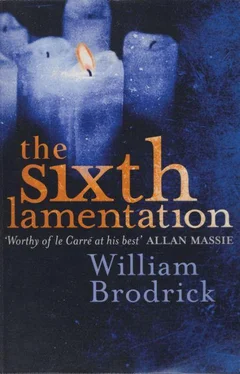William Brodrick - The Sixth Lamentation
Здесь есть возможность читать онлайн «William Brodrick - The Sixth Lamentation» весь текст электронной книги совершенно бесплатно (целиком полную версию без сокращений). В некоторых случаях можно слушать аудио, скачать через торрент в формате fb2 и присутствует краткое содержание. Жанр: Триллер, на английском языке. Описание произведения, (предисловие) а так же отзывы посетителей доступны на портале библиотеки ЛибКат.
- Название:The Sixth Lamentation
- Автор:
- Жанр:
- Год:неизвестен
- ISBN:нет данных
- Рейтинг книги:5 / 5. Голосов: 1
-
Избранное:Добавить в избранное
- Отзывы:
-
Ваша оценка:
- 100
- 1
- 2
- 3
- 4
- 5
The Sixth Lamentation: краткое содержание, описание и аннотация
Предлагаем к чтению аннотацию, описание, краткое содержание или предисловие (зависит от того, что написал сам автор книги «The Sixth Lamentation»). Если вы не нашли необходимую информацию о книге — напишите в комментариях, мы постараемся отыскать её.
The Sixth Lamentation — читать онлайн бесплатно полную книгу (весь текст) целиком
Ниже представлен текст книги, разбитый по страницам. Система сохранения места последней прочитанной страницы, позволяет с удобством читать онлайн бесплатно книгу «The Sixth Lamentation», без необходимости каждый раз заново искать на чём Вы остановились. Поставьте закладку, и сможете в любой момент перейти на страницу, на которой закончили чтение.
Интервал:
Закладка:
‘Then choose the details which you remember best.’
‘I said I can remember everything, sir. I cannot forget:
‘You remember the armed guards?’
‘They were French, my own countrymen. ‘‘The provision of electricity?’
‘Almost entirely lacking.’
‘How many prisoners to a room?’
‘About fifty:
‘Sleeping on what?’
‘Bunk beds, planks. Many slept on plain straw ‘
‘If I may say so, Madame Beaussart, your memory is without fault.’
Lucy glanced at the judge, his head still, his hand writing down every word as it fell.
Mr Bartlett picked up a sheet of paper. He seemed to hover over its contents, then spoke in the same even, encouraging voice.
‘Do you recollect anything in particular about Mr Schwermann’s appearance?’
‘He was very handsome, with blond hair standing out against his black uniform.’
‘Let me test your memory again, Madame.’ Mr Bartlett was smiling winsomely ‘Do you recall the leather riding breeches?’
‘Yes, I do. They shone.’
Mr Bartlett paused to look at the sheet of paper.
‘You would agree this form of dress was distinctive?’
‘Oh yes.’
‘Idiosyncratic?’
‘Yes.’
‘Utterly memorable?’
‘Yes.’
‘Almost a caricature of a German officer, the sort of thing you’ve seen in the films?’
‘No, not in films. I don’t watch them. I can’t bear to. I have pictures of my own and they’ve never gone away I cannot forget that man and what he did. Never, never, never.
Madame Beaussart covered her mouth.
‘Would you like a glass of water, Madame?’
She nodded. And with shaking hands she tried to drink, spilling water over her fingers.
The judge put down his pen, saying, ‘Do take your time.’
‘I’m sorry,’ she mumbled, ‘I’ve waited all my life for this moment.’
‘We all understand,’ said the judge.
Mr Bartlett waited until Madame Beaussart was ready to continue and them he handed the sheet of paper to the usher, to be passed on to the witness.
‘Would you be so kind as to look at this photograph?’
The witness took off her glasses and produced another pair from a small pouch.
‘That is the man you have been describing, isn’t it?’
Without hesitation she replied, ‘Yes, that is him. Schwermann.’
‘And of that you are sure?’
‘Yes.’
‘His appearance is etched in your memory?’
‘Yes.’
‘Look again, Madame. Is there nothing that causes you to doubt your judgment? It was, after all, over fifty years ago.’
‘I will never forget the man who forced those children on to the buses.’
Inching towards the jury, Mr Bartlett said: ‘Madame Beaussart, you have been right about everything you have told the court today Except in one important detail. But let me make it plain, I do not challenge your candour. The man in the photograph did supervise deportations from Drancy. He has already been convicted by a German court, in a trial you were unable to attend because of a serious illness from which, thankfully, you have recovered.’
Madame Beaussart, bewildered, could not speak.
‘You have correctly identified someone else, not Mr Schwermann. I will supply the details to the court in due course.
He sat down, the flap of his silk gown disturbing loose papers laid out neatly on the table before him.
Chapter Twenty-Nine
1
Anselm got back to Larkwood just after Vespers, in time for a brief conference with Father Andrew before supper. They sat in the Prior’s study, looking out over the cloister garth. It was a calm evening and long shadows lay on the neat grass like canvas sheets of scenery fallen flat.
Father Andrew asked, ‘How did they respond when you said the police were powerless?’
‘With inspiring equanimity. I’d prepared myself for bewildered anger.’
‘Those close to politics often understand better than most the limits of the law’
‘There was something between them though, coming I think from the mother, something like an accusation. That is where the anger lay, the confusion. And by accident I think I trespassed upon it:
‘. Anselm,’ said the Prior dryly, ‘most of your accidents stem from intuition let loose. What did you say?’
‘We were talking about Pascal and I mentioned Agnes, that she had had a child, and I asked if she’d ever been known to the family’
‘And?’
‘The mother said absolutely nothing but the father said Jacques never knew anyone called Agnes… we weren’t talking about Jacques but he made the link.’
‘And you call that an accident?’
Anselm remonstrated, ‘Not far off. My best cross-examinations were always by mistake. I didn’t realise how clever it looked until it was done:
The Prior smiled with faint indulgence. Anselm continued, ‘Anyway I then had a most peculiar encounter with the butler. Throughout he pours the tea, sidles in, says nothing, sidles out… but when he shows me the door he tells me he knew Agnes and held her child. He then gives me a letter to deliver to Agnes from Jacques, a letter he’d guarded since the war on the off-chance she survived.’
The two monks pondered in silence. Frowning, Father Andrew said, ‘It is clear from what Max Nightingale said to you that his grandfather, somehow, knew both Jacques and Agnes. In this whole tragic business they seem to be the only ones to have reduced him to a state of panic. So they must have come across each other during the war…’ He rounded on Anselm: ‘What was that riddle you were told about Schwermann at Les Moineaux?’
‘That he had risked his life to save life.’
The Prior tilted his head as though straining to catch distant voices. His glittering eyes vanished behind long creases… but whatever he’d sensed was slipping out of reach.
The bell rang for supper. Anselm said, ‘The strange thing is, how do Etienne Fougeres and his wife come to know about Agnes and her child?’
They rose and entered the corridor. The busy sound of other feet heading down to the refectory echoed from a stairwell. The Prior replied, ‘Jacques’ family must have passed it on after his death’ — he followed his insight through — ‘and in due course Etienne told his wife… but they did not tell their son, Pascal… a secret known by a paid servant, a butler… now, why’s that?’
Intuition failed them both and they went into the refectory.
2
The evening meal was the usual emetic blend of leftovers from the guesthouse. Anselm pushed something purple around his plate. There would be no knowing what it had been in its many previous lives. Afterwards, the community filed into the common room for recreation, where Anselm joined Wilf in his usual corner by the aspidistra that no one watered but yet miraculously never died. It was one of Wilf’s greatest attributes that he used events in his life as a prompt for research into things about which he knew nothing. After Schwermann’s arrival he had quietly buried himself in reading about the Occupation and its aftermath. He liked to share his findings and Anselm enjoyed his reported forays, marked as they were by the wonder of David Bellamy having found a new snail in the garden.
‘Wartime creates its own unique moral dilemmas,’ uttered Wilf with Delphic calm, inviting a request for more disclosure.
‘Why’s that?’ obliged Anselm.
‘Well,’ said Wilf, gratified and settling back, ‘there’s the strange case of Paul Touvier. A traditionalist Catholic but in the Vichy Milice. Pushed into it by his father and a priest. So he’s French, policing the French for the Germans. ‘
‘A collaborator,’ contributed Anselm obviously
Читать дальшеИнтервал:
Закладка:
Похожие книги на «The Sixth Lamentation»
Представляем Вашему вниманию похожие книги на «The Sixth Lamentation» списком для выбора. Мы отобрали схожую по названию и смыслу литературу в надежде предоставить читателям больше вариантов отыскать новые, интересные, ещё непрочитанные произведения.
Обсуждение, отзывы о книге «The Sixth Lamentation» и просто собственные мнения читателей. Оставьте ваши комментарии, напишите, что Вы думаете о произведении, его смысле или главных героях. Укажите что конкретно понравилось, а что нет, и почему Вы так считаете.












